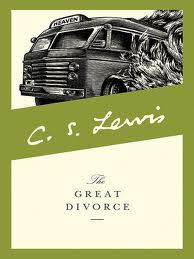The Great Divorce
A Dream
by C.S. Lewis
Today’s column is a Memory Maker book review. Memory Maker books are those that are not recent publications, but which come to mind frequently, as good books will.
Last Saturday night, friends from far and near met for our quarterly book club at Greg and Tracey Finck’s home in rural Princeton, Minnesota. There were twelve of us who gathered — a friendly and significant number. The book chosen for that evening’s discussion was the classic written by C. S. Lewis, The Great Divorce.
Many of us had read The Great Divorce before, in high school or college, but had never discussed this intriguing story in a book club setting. In former years, I had held the opinion that re-reading books was squandering precious hours. But thanks in part to book clubs, I have had a change of heart. There are lots of reasons for this change, maturity and personal growth being one of them of course. But there’s also a rich enjoyment in re-visiting a book from the past in the company of others. If you have ever hesitated to re-read a book, whether for a book discussion or simply for your own pleasure, give it a try. The book hasn’t changed, but you have, and it will likely be an entirely different reading experience for you.
The Great Divorce, a theological fantasy, was written by Lewis around 1944.This short book, originally published in the UK by Geoffrey Bles, was Lewis’s effort to discredit the idea that Heaven and Hell are compatible with one another, and that “some way of embracing both alternatives can always be found.”
It was noted by Greg Finck at the beginning of our discussion that in the preface to The Great Divorce, Lewis states that he wanted to be clear that the book is a fantasy – a work of “imaginative supposal” he called it. He intended for the story to be seen as having a moral, but he did not want the reader to think that the descriptions he gave of heaven and hell were factual in any way.
The initial setting for The Great Divorce is a bus. On this bus, several figures are being transported to a place which they are not certain is a desirable location — the outer districts of heaven known as The Solid Land. The figures on the bus are ghosts – phantoms of their former earthly selves. They are leaving the Grey Town region of hell, but instead of being glad that they are on their way out of hell, the ghosts complain about the bus driver, the other people on the bus, and their destination. The main character, who is Lewis himself, is also a ghost. Lewis acts primarily as the observer and narrator of the story, and he is puzzled by the behavior he sees on the bus ride to The Solid Land.
The main action of the story takes place after the ghosts exit the bus and enter the Solid Land. All through the The Great Divorce ,Lewis meets various ghosts who bring to the Solid Land their own story of pain and sin. Each ghost and story is known by a heavenly figure, called a Solid Being, who meets with the ghost at some point during his or her stay in the Solid Land, and is known to the ghost through a relationship they had on earth. Lewis is a bystander as each ghost communicates with their Solid Being, whose mission it is to guide the ghost toward choosing the path toward heaven. By means of these interactions, the reader sees the struggle each ghost has in facing its own personal hell (self-centeredness, vanity, theft, materialism, and so forth) and choosing to give it up for a life in heaven. The nature of choice is certainly one of the themes of The Great Divorce and was the one that launched the most discussion in our group during book club.
Lewis also has a Solid Being to guide him as he navigates the unfamiliar terrain of the Solid Land: George MacDonald, Scottish poet, author and minister. Lewis was a great admirer of MacDonald. In our discussion, Tracey Finck shared that in the book George MacDonald – An Anthology, which was edited by Lewis and for which he wrote the preface. Lewis credits MacDonald with bringing about a spiritual change in his life: “What it (MacDonald’s book Phantastes) actually did to me was to convert, even to baptize . . . my imagination.” In The Great Divorce, as MacDonald and Lewis witness the intense interactions occurring between the beings from heaven and hell, MacDonald directs Lewis’s thinking toward the mercy and love of God. Lewis sees that each confrontation a ghost has with a Solid Being is a fateful moment. As McDonald says, “This moment contains all moments.” MacDonald’s words cause Lewis to face his own sin and need for salvation, but Lewis experiences a moment of terror when he believes Morning (Christ) has come without his having made the choice for Jesus as his Lord. “The Morning! The Morning! I am caught by the morning and I am a ghost.”
Our book group had a lively conversation about the many ghost characters in The Great Divorce, and their personal “hells,” and the way so many of us would, as book club member Julie Pruett put it, “…rather stay in a familiar hell than step into a situation that is better but unfamiliar to us.”
There are many reasons why C.S. Lewis is a beloved author, and why his books are still in print – The Great Divorce is one of them. If you haven’t read it yet, I hope you will soon. And if you have read it before, find your copy, read it again, and gather a few friends together to talk about it. You won’t be disappointed.

